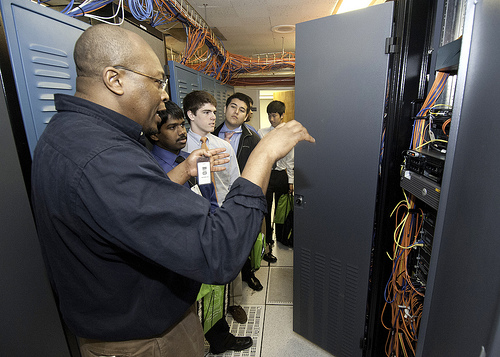


Job shadowing programs expose teens to career opportunities they may not have previously considered, which is why the AAPD is looking to make more available to young people with disabilities.
The American Association of People with Disabilities (AAPD) is building on the success of its Disability Mentoring Day job shadowing program with the “DMD Pipelines of Talent Initiative,” co-founded with Mitsubishi Electric America Foundation and launched last week in celebration of the onset of National Disability Employment Awareness Month.
Since the White House established October 17 as Disability Mentoring Day in 1999, the program has connected 16,500 jobseekers with businesses in 250 locations across the United States. In her post for the AAPD Power Grid blog, programs manager Dana Fink said the DMD Pipelines of Talent Initiative in particular draws on the success of the Chicago Mayor’s Office for People with Disabilities program, which has taken the single-day event and expanded it into what Fink called “an innovative model of year-round mentoring.”
The AAPD has published a 13-page toolkit (PDF) that outlines the job shadowing model used in Chicago since 2001. The city’s program starts with workshops that help participants develop career skills such as resume writing, money management, and interviewing for jobs. The October 17 Disability Mentoring Day is then used to recruit employers who might offer job shadowing opportunities to young people. The shadowing assignments are designed to provide “as much exposure as possible to the overall operation” of a business and create workplace interactions with other employees. PepsiCo is used as an example:
Fifteen students came to corporate headquarters. They heard detailed explanations of five career paths within the company and then took part in 90-minute, one-on-one mentoring sessions. After a group lunch, which featured a Q&A between students and employees […] a research and development scientist explained the science of Gatorade and then the students made their own flavor and color and gave the product a name… About 30 PepsiCo employees volunteered to help out on job shadow days as presenters, mentors and coordinating lunch and activities.
In phase three, employers provide summer jobs through a Youth Employment Program (YEP). These are 4-6-week assignments that provide at least 20 hours/week of paid work. Students have to apply and interview for the available jobs and are responsible for making their own commuting arrangements. Since 2008, Chicago’s program has given job experience to 140 students. The guide offers the success story of Mike Lewis, a summer hire of the regional transportation service, Pace:
The job lasted far beyond the summer. Mike has worked in the paratransit operations office ever since. He works full-time [and] makes $12 per hour. Mike also went on to pursue a graduate degree in sociology and while classes were in session, his employer allowed him to work 20 hours a week. ‘It’s a win-win,’ Mike says.
In addition to the toolkit, the DMD Pipelines of Talent Initiative will allocate micro-grants to support the implementation of the program in communities and help fund paid summer internships to young people with disabilities. As Fink says at the close of her post, “the shift to a culture of inclusivity happens every day.” Programs like Chicago’s DMD and ATI’s StarWorks help make that happen.
Comments?
Image by USDAgov.